Contents
Carrots are a tasty and very healthy root vegetable. It is rich in provitamin A, which boosts immunity and is an effective antioxidant. There are many different varieties on offer. To choose the right one, you need to take into account the purpose of specific root crops and the purpose of cultivation.
In what cases is it worth buying a late variety
Carrots, depending on the variety, can be either orange or yellow, scarlet, lilac and even black. A bright reddish hue is formed due to the high content of carotene. Varieties also differ in shape, size and maturity. If you plan to store the crop for a long time, it is better to choose one of the late-ripening varieties of carrots.
The following are the main characteristics of root crops with a long ripening period.
- They ripen within 130-150 days.
- Harvest occurs in most cases in September.
- Long shelf life without loss of taste.
In addition to varieties, hybrids can be found in the windows. They are recognized by the F1 mark. If you collect the seeds of hybrids for the next season, they will no longer grow crops with the same characteristics. Experienced gardeners recommend purchasing several types of seeds and seeing what the result will be.
Overview of late-ripening varieties
Compared to mid-season varieties, late ones do not produce such sweet fruits. As a rule, carrots grow large, stored for a long time.
The Red Giant
The name given to this variety is not accidental – the roots grow very large, their length reaches 27 cm. The shape is cone-shaped, the outer surface is smooth. Root crops ripen for a long time – sometimes the period is six months. They have a mild taste and are stored for a long time. For the best maturation, they need intensive watering and well-fertilized soil.
Flyers
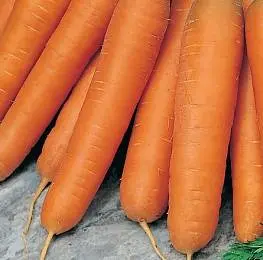
This variety ripens faster, 4 months before ready-to-use fruits. Carrot bright color, conical shape. The maximum length is 25 cm. Root crops are universal in use. They are used for juices, salads, canning, as well as for preparing children’s meals. They can lie in the cellar for a long time.
Red without core
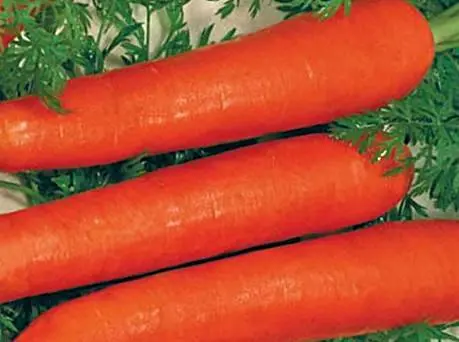
As the name implies, root crops lack a pronounced core. This is a productive carrot, it ripens for 130 days. The fruits are crispy, sweet, smooth, rich orange. The length of one carrot is 20 cm. The variety is well stored, requires regular watering and loosened soil.
Bayadere
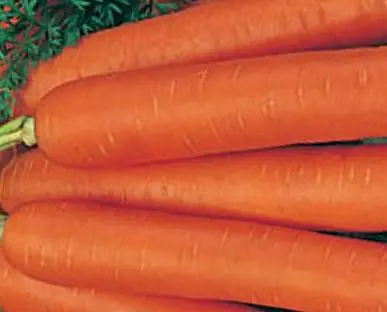
This carrot is characterized by abundant harvests and unpretentious care. Root crops grow very large – about 30 cm. The color is rich orange, the outer surface is even, the shape is cylindrical. The fruits are very rich in carotene. They can be stored for a long time without loss of taste.
Vita Longa
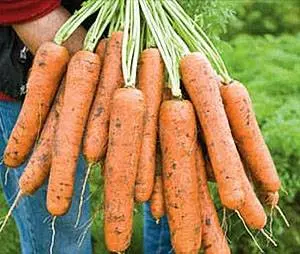
One of the late and high-yielding varieties. Forms very large root crops with dense pulp and pleasant sweetish taste. The first harvest can be harvested after 145-160 days. Carrot grows 31 cm long, 4,5 cm in diameter. It is preferable to use this variety for canning, juicing or salads. It can be stored for a whole year – until the next harvest.
The Queen of Autumn
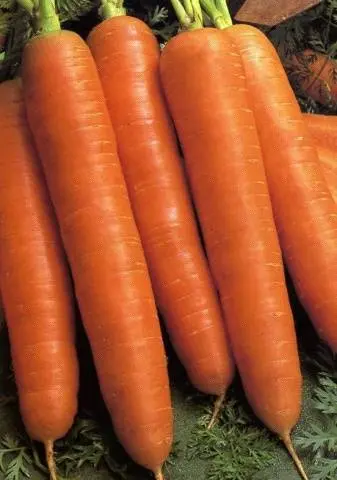
A late variety bearing cylindrical fruit. Carrots reach a length of 20-25 cm, weight up to 180 g. It has a reddish-orange hue, has a dense and juicy pulp.
MO (special carrot)
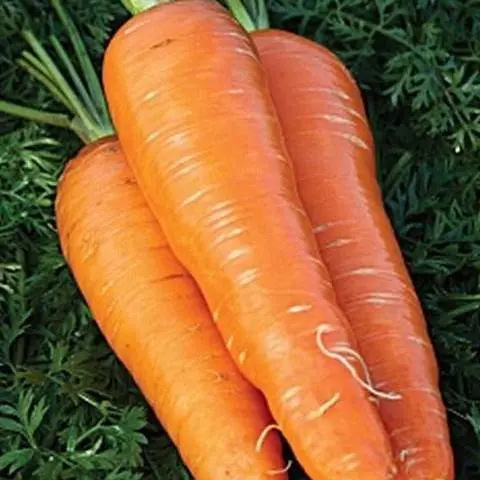
It belongs to medium-late varieties with high yields. Root crops grow cone-shaped, reddish-orange in color. They have juicy pulp with a pleasant sweetish taste. Can be stored for a long time. Seeds of this variety can be sown in winter.
Flacoro
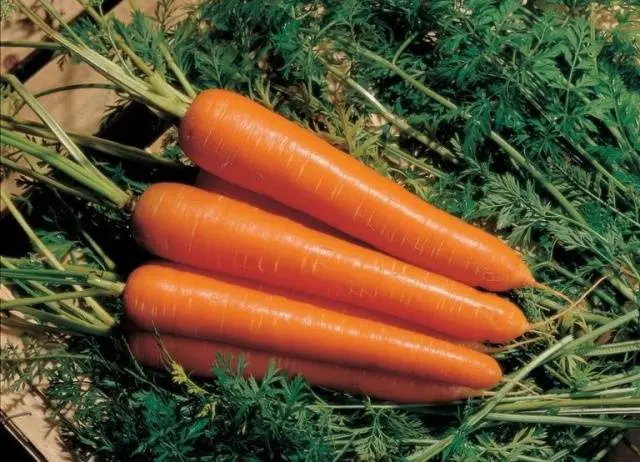
This late variety bears bright orange fruits up to 39 cm long and weighing 200 g. The shape is cone-shaped, the nose is blunt.
The Emperor
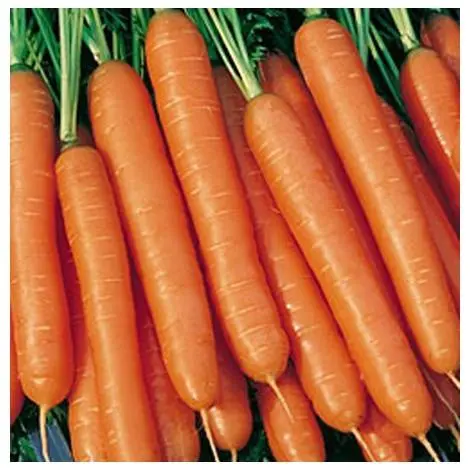
Another type of root crop with a blunt nose. Carrots are quite large, the length is 30 cm, weight 200 g. The flesh is orange in color with a dense structure.
Late varieties have a pleasant taste. Root vegetables can be eaten fresh or used to prepare various dishes. Most of them have a long shelf life and can last until the next harvest.
Chantene 2461
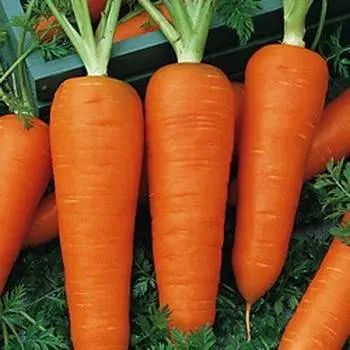
A very common variety that produces cone-shaped fruits. Carrots are short and voluminous with dense orange pulp. The mass reaches 300 g, with abundant watering, root crops are harvested and 500 g each. The taste is average. Long term storage is possible.
Basically, late varieties ripen in 120-140 days from the day the seedlings appeared. They resist diseases, are more resistant to low temperatures and persist for a long time – until June.
How to save a carrot crop
Carrots will last until next season if stored properly. There are a number of ways to create such conditions. They don’t cost a lot.
- Storage of carrots in a box with fine filler. Alternatively, they take a box of boards and sifted fine sand. The box is placed in a cool place, such as a cellar. Sand is poured into it with a layer of about 5 cm. Root crops are laid on top of this filler at such a distance that there is no contact. After the first layer, sand is poured again, carrots are laid on top. The last batch of fruits is covered with sand. You can use onion peel or coniferous sawdust as a filler.
- Shelter beds with carrots. Although this method will save only part of the crop, the roots will retain their characteristics perfectly. The essence of the method is as follows: when the crop is harvested, part of the carrots are left in the beds. Before the first cold weather, the tops are cut flush with the soil, sand is poured over the beds and a film is laid. Next, a layer of sawdust or other similar material is poured and covered again with a film. In such a natural cellar, carrots will survive all the cold.
- Storage in plastic bags. This method is more suitable for industrial cultivation, but you can try it at home. It is important to meet several requirements. Firstly, only root crops with an intact surface can be stored in this way. Let them dry well in the shade before packing. No more than 3 kg of carrots are placed in each bag. The most important point is that the packages cannot be tied. This method will allow you to maintain the optimal level of humidity so that the crop does not rot and does not wither.
- The last option for storing whole carrots is clay coating. First, the harvested crop is sorted and dried. Pure clay, which does not contain any impurities, is dissolved to the consistency of sour cream. Carrots are immersed in this solution. After drying, a protective film remains on the roots. In this form, the crop can be folded into cardboard boxes or wooden boxes.
Such methods will allow you to save grown carrots until the end of spring – the beginning of summer. From the side of the gardener does not require special labor costs.
How to store prepared carrots
The following method is of particular interest to gardeners who produce modest yields. This is freezing.
- First, the fruits should be prepared. They are finely chopped with a combine or cut into rings.
- Prepare plastic bags. They must be new.
- Sliced carrots are laid out in bags and tightly tied (if possible, welded).
- Packages with carrots are placed in the freezer.
This method will help save carrots for cooking. In this case, the roots do not have to be cut before adding to the soup or side dish.
Which varieties keep best
Some varieties may lie until the next season. The following are the most keeping of the late varieties.
Sweet winter
Root crops grow bright orange, cone-shaped. The variety is very productive, the growing season is up to 150 days. On average, the length of one carrot reaches 20 cm. The fruits are perfectly preserved until June, without losing either in appearance or in taste. Carrots don’t crack. Versatile in application.
Olympus
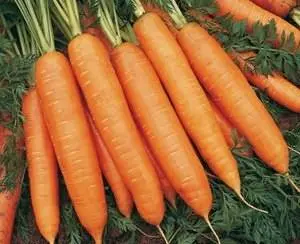
Another late and high-yielding variety. Designed for long term storage. One root crop grows up to 20 cm long, weight 130 g. When ripe, it does not crack, it can be stored until the very end of May. The outer surface is bright orange, the flesh is dense, with a sweet taste. Carrots are versatile.
Dolyanka
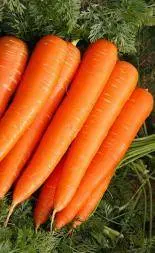
This variety of carrots from Poland is characterized by high yields, and in optimal conditions it will lie until the end of May. The root crop reaches 25-28 cm in length, weight is about 130 g. It resists fusarium and carrot fly well.
The above described several methods that will help to guarantee the preservation of the crop until the new season. You can leave in the winter as whole root crops, as well as prepared and chopped. The latter are stored by freezing.
Original late variety
When the word “carrot” is mentioned, a cylindrical or cone-shaped root crop of bright orange color comes to mind. In fact, among the late-ripening varieties, there are varieties that go beyond this idea. The following is about one of them.
Yellowstone (Yellowstone)
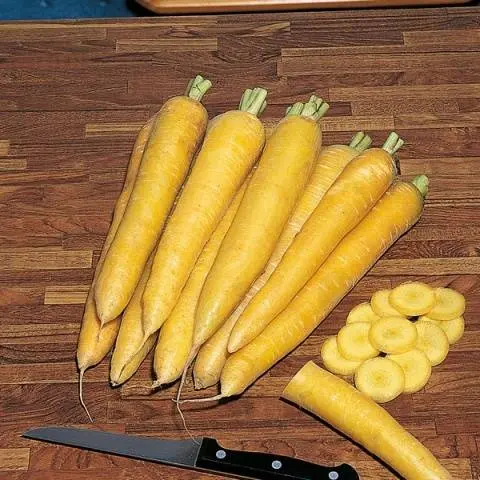
Perhaps this is the sunniest of the late varieties of carrots. Root crops are bright yellow in color and spindle-shaped. Their length reaches 20-25 cm, weight is about 200 g. It gives a bountiful harvest. It has juicy pulp.
Colored carrots are a great addition to fresh salads and other homemade dishes. It will allow you to create original combinations on your table.
Secrets of growing carrots
At first glance, it may seem that growing carrots should not be difficult. In fact, here, as in other areas of gardening, there are nuances. This root crop is quite demanding on growing conditions. To get a good harvest, these features should be taken into account.
- Before planting carrots, you need to carefully prepare the soil. The bed is dug up and well fertilized. As top dressing use humus or compost. To make the soil lighter, it is worth pouring sawdust. They dig the soil to a depth of about 35 cm. In loose soil, carrots grow more evenly. These roots are planted in rows. Therefore, grooves are prepared in the garden at a distance of 20 cm from each other. They are approximately 2 cm deep.
- When the soil is ready, you can sow the seeds. It is better to first pour them out of the bag into your hand, then distribute them along the grooves and cover with a layer of earth.
- After sowing carrots, it is recommended to compact the soil. You can do this directly with your hand or flatten the soil with a wooden board.
- Now it remains to wait for the first shoots – they will appear within 10 days.
A bed for carrots needs to be prepared in a sunny area. Throughout the growth period, plants require care. This includes regular watering, loosening the soil, weeding and hilling.
What is useful carrots
This root crop has a fairly wide scope. Carrots are actively used in the kitchen: they are consumed fresh, boiled or stewed. It is also used in folk medicine and home cosmetics.
The prevalence of carrots is explained by the high content of a number of vitamins: B, C, E, K, PP. It is also rich in provitamin A. Minerals are also present in the pulp, for example, iron, phosphorus, magnesium and copper.
As you can see, carrots are an important part of a healthy diet. To keep the crop longer, when choosing seeds, you should pay attention to the “late” mark. Its ripening period is about 130-150 days. Many of these varieties are high yielding. It is worth considering that carrots are quite demanding on watering and soil composition. Plants will have to be cared for throughout the entire period of growth and maturation. Under the right conditions, the crop will last all winter until the next season.









